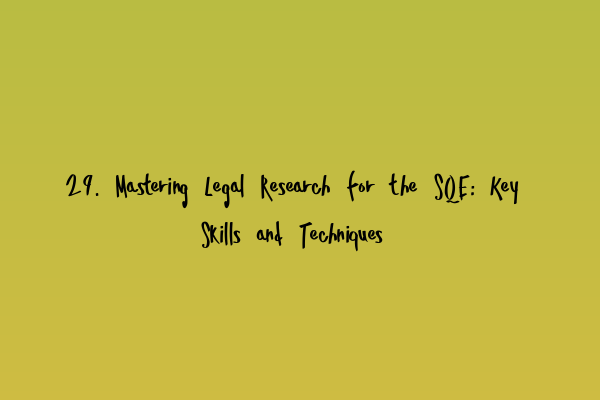Mastering Legal Research for the SQE: Key Skills and Techniques
Are you preparing for the Solicitors Qualifying Examination (SQE) and feeling overwhelmed by the prospect of mastering legal research? As a solicitor, having strong research skills is essential to effectively represent your clients and provide accurate legal advice. In this blog post, we will explore key skills and techniques to help you excel in legal research for the SQE.
Before we delve into the specifics, let’s briefly discuss why legal research is so important. Legal research involves finding and analyzing legal information to support legal arguments, understand case law, interpret statutes, and provide accurate advice to clients. It helps you navigate the complex world of law and ensures that you are up to date with the latest developments in your practice area.
Now, let’s dive into the key skills and techniques that will help you master legal research for the SQE.
1. Understanding the Research Process:
To become a proficient legal researcher, it is crucial to understand the research process. Start by identifying the legal issue or question at hand. Break it down into smaller components and determine the key legal concepts involved. This will help you create an effective research strategy and save time in your research endeavors.
2. Utilizing Primary and Secondary Sources:
Legal research involves utilizing both primary and secondary sources. Primary sources include statutes, regulations, case law, and constitutional documents. These are essential for understanding the law and its application. Secondary sources, such as legal textbooks, journal articles, and practice guides, provide valuable commentary and analysis on the law. Make sure to utilize a wide range of sources to gain a comprehensive understanding of the legal issues you are researching.
3. Enhancing Your Online Research Skills:
In today’s digital age, online research plays a vital role in legal research. Familiarize yourself with legal research databases, such as Westlaw and LexisNexis, which provide access to a vast array of legal resources. Develop your search skills by using advanced search techniques, such as Boolean operators, proximity operators, and field searching. These techniques will help you find the most relevant and authoritative sources efficiently.
4. Analyzing Legal Authority:
Once you have gathered relevant legal sources, it is important to analyze their authority. Assess the binding and persuasive value of cases, determine the hierarchy of statutes, and evaluate the relevance and reliability of secondary sources. This critical analysis will strengthen your legal arguments and ensure that you provide accurate advice to clients.
5. Keeping Up with Legal Developments:
The law is constantly evolving, and it is crucial for solicitors to stay up to date with the latest legal developments. Subscribe to legal publications, join professional networks, and follow reputable legal blogs to stay informed. Regularly check for updates in legislation, case law, and legal commentary relevant to your practice area. This will demonstrate your commitment to ongoing professional development and ensure that your legal research is always up to date.
6. Practice, Practice, Practice:
Like any skill, legal research improves with practice. Take advantage of SQE 1 practice exam questions and SQE 1 practice mocks FLK1 FLK2 to test your legal research skills. These resources will help you familiarize yourself with the type of questions you may encounter in the SQE exams and provide you with valuable feedback on your performance.
To enhance your legal research skills further, consider enrolling in SQE 1 preparation courses and SQE 2 preparation courses. These courses are specifically designed to equip you with the knowledge and skills necessary to excel in the SQE exams.
In conclusion, mastering legal research is essential for success in the SQE exams and your future career as a solicitor. By developing key skills such as understanding the research process, utilizing primary and secondary sources, enhancing your online research skills, analyzing legal authority, staying up to date with legal developments, and practicing regularly, you will be well-prepared to tackle any legal research challenge that comes your way.
Remember, legal research is not just about finding information—it’s about critically analyzing and applying that information to real-world legal scenarios. Continuously honing your legal research skills will set you apart as a competent and knowledgeable solicitor.
To learn more about SQE exam dates and preparation, check out our related articles:
– SQE 1 Practice Exam Questions
– SQE 1 Practice Mocks FLK1 FLK2
– SQE 2 Preparation Courses
– SQE 1 Preparation Courses
– SRA SQE Exam Dates
Best of luck with your SQE preparation journey!
